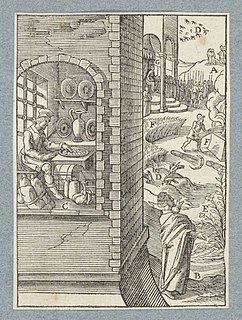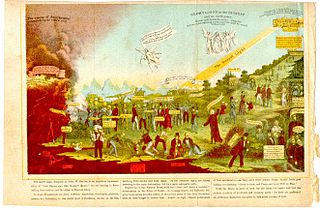Related Research Articles

Matthew 5:15 and Matthew 5:16 are the fifteenth and sixteenth verses of the fifth chapter of the Gospel of Matthew in the New Testament. They are part of the Sermon on the Mount, and is one of a series of metaphors often seen as adding to the Beatitudes. The previous verse compared the disciples to a City upon a Hill that can't be hidden. These verses present a similar analogy.

John 5 is the fifth chapter of the Gospel of John of the New Testament of the Christian Bible.

Matthew 6:19 and 6:20 are the nineteenth and twentieth verses of the sixth chapter of the Gospel of Matthew in the New Testament and are part of the Sermon on the Mount. These verses open the discussion of wealth. These verses are paralleled in Luke 12:33.

Matthew 6:26 is the twenty-sixth verse of the sixth chapter of the Gospel of Matthew in the New Testament and is part of the Sermon on the Mount. This verse continues the discussion of worry about material provisions. In this verse Jesus tells his followers not to be anxious about food, but to rely on God as the birds, who are worth far less than people, are fully provided for.

Matthew 6:29 is the twenty-ninth verse of the sixth chapter of the Gospel of Matthew in the New Testament and is part of the Sermon on the Mount. This verse continues the discussion of worry about material provisions.

Matthew 7:14 is the fourteenth verse of the seventh chapter of the Gospel of Matthew in the New Testament and is part of the Sermon on the Mount. This verse continues a metaphor begun in the previous one about the ease of following the wrong path.

Matthew 12 is the twelfth chapter in the Gospel of Matthew in the New Testament section of the Christian Bible. It continues the narrative about Jesus' ministry in Galilee and introduces controversy over the observance of the Sabbath for the first time.

John 11 is the eleventh chapter of the Gospel of John in the New Testament of the Christian Bible. It records the raising of Lazarus from the dead, a miracle of Jesus Christ and subsequent development of the plot against Jesus. The author of the book containing this chapter is anonymous, but early Christian tradition uniformly affirmed that John composed this Gospel.

John 12 is the twelfth chapter of the Gospel of John in the New Testament of the Christian Bible. It narrates an anointing of Jesus' feet, attributed to Mary of Bethany, as well as a version of the triumphal entry of Jesus Christ into Jerusalem. The author of the book containing this chapter is anonymous, but early Christian tradition uniformly affirmed that John composed this Gospel.
John 16 is the sixteenth chapter of the Gospel of John in the New Testament of the Christian Bible. It records Jesus' continued farewell discourse to his disciples, set on the last night before his crucifixion. Three key words in this chapter, ἁμαρτία, δικαιοσύνη, κρίσις "comprehend the three great steps of advance in spiritual truth among men". Jesus speaks about the work of the Holy Spirit, the joy of the believers and his victory over the world. The book containing this chapter is anonymous, but early Christian tradition uniformly affirmed that John composed this Gospel.

Matthew 7:17 and Matthew 7:18 are the seventeenth and eighteenth verses of the seventh chapter of the Gospel of Matthew in the New Testament and is part of the Sermon on the Mount. This verse continues the section warning against false prophets.

Matthew 10:13 is the thirteenth verse in the ninth chapter of the Gospel of Matthew in the New Testament.
Matthew 9:17 is a verse in the ninth chapter of the Gospel of Matthew in the New Testament.
Matthew 11:16 is the sixteenth verse in the eleventh chapter of the Gospel of Matthew in the New Testament.
Matthew 12:4 is the fourth verse in the twelfth chapter of the Gospel of Matthew in the New Testament.
Matthew 10:24 is a verse in the ninth chapter of the Gospel of Matthew in the New Testament.
Matthew 12:21 is the 21st verse in the twelfth chapter of the Gospel of Matthew in the New Testament.
Isaiah 40 is the fortieth chapter of the Book of Isaiah in the Hebrew Bible or the Old Testament of the Christian Bible, and the first chapter of the section known as "Deutero-Isaiah", dating from the time of the Israelites' exile in Babylon. This book contains the prophecies attributed to the prophet Isaiah, and is one of the Books of the Prophets. Parts of this chapter are cited in all four canonical Gospels of the New Testament.

John 1:13 is the thirteenth verse in the first chapter of the Gospel of John in the New Testament of the Christian Bible.

John 1:23 is the twenty-third verse in the first chapter of the Gospel of John in the New Testament of the Christian Bible.
References
- ↑ John MacEvilly, An Exposition of the Gospel of St. John consisting of an analysis of each chapter and of a Commentary critical, exegetical, doctrinal and moral, Dublin Gill & Son 1879.
- 1 2 3 "Catena aurea: commentary on the four Gospels, collected out of the works of the Fathers: Volume 6, St. John. Oxford: Parker, 1874. Thomas Aquinas".
 This article incorporates text from this source, which is in the public domain .
This article incorporates text from this source, which is in the public domain .